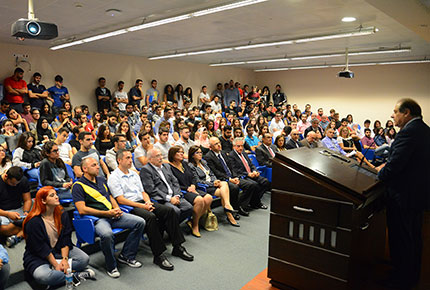Labor minister urges students to join protests
Sejean Azzi holds a no-holds-barred discussion with LAU students.

According to Azzi, the brain drain is the result of poor planning in both the marketplace and educational sector.
“Most projects undertaken in Lebanon since the 1990s have produced money and corruption, but not jobs,” said Minister of Labor Sejean Azzi to dozens of students who gathered on Monday to hear him discuss the challenges facing him, his ministry and the Lebanese job market.
As he spoke, a group of students in the back rows of the audience raised a banner with the slogan: ‘The Garbage is Affecting the Job Market.” Azzi agreed with the sentiment and urged his listeners to join in ongoing protests. “The garbage crisis was created intentionally so corrupt individuals could line their pockets. You students must be the revolutionaries who bow down to no one and nothing but your conscience,” urged the minister and former journalist.
Azzi has been a controversial figure of late, imposing new restrictions on work visas that have affected international NGOs and Syrian refugees. According to the minister, hundreds of thousands of Syrians are working in Lebanon without a permit, contributing to the rise in unemployment among the Lebanese work force, which has risen from 11.3 percent to 25 percent since 2011.
A number of other factors are also negatively impacting the future of Lebanese youth, added Azzi. Recalling his first job as a journalist in 1973, he said: “With my salary of 250 liras, I was able to afford a car, rent and a social life. Rent is now so high that our youth prefer to emigrate.”
According to Azzi, the brain drain is the result of poor planning in both the marketplace and educational sector. “We need Syrians and foreigners to work in a number of sectors that the Lebanese either don’t want to or are unable to work in,” he said. The lack of vocational training programs are a particular problem. “Greed led to government licensing of dozens of universities in the 1990s, but what is the point of gaining knowledge if you can’t secure a future? It was a crime for them to create graduates but not jobs.”
Emphasizing the problem, Azzi highlighted the saturation of graduates in certain professions. For example, Lebanon boasts one doctor for every 350 citizens — compared to one in 1,500 internationally — and there are three times as many pharmacists and four times as many dentists per capita as the international average. “This explains why I receive requests for chauffeur permits from graduates of engineering,” said Azzi.
Asked by one student why he was presenting challenges but not solutions, Azzi said that no minister could effect change alone. “All I myself can change is 0.01 percent. Any solution I propose — and I propose many — cannot happen without government support.” For example, the minister revealed that only 123 of the 263 staff positions within the ministry are filled, hampering its productivity. “When I try to fill only 20 percent of the vacancies, I am blocked by the council of ministers.”
Asked by another student why Azzi was proposing state-sanctioned bribery by introducing a paid-for fast track system at the ministry, Azzi said that his proposed system was in line with those offered at foreign embassies in Beirut and ministries abroad. “We created a schedule for each of the 23 services we offer so that staff and citizens and residents would know what to expect in terms of turnaround. Fast-track services are not bribes. On the contrary, the concept attacks corruption and bribery, though I know this too is difficult.”
One of the difficulties, added Azzi, was the lack of cooperation from citizens who are afraid to name names when it comes to complaints of corruption. “They know that I as a politician will not always be in this position, but the civil servant will and so they choose silence.” Throughout his talk, Azzi urged the students to actively engage as citizens against corruption, use their voice at the ballot box, and fight traditional politics. “Secularism,” he stressed, “makes us all citizens.”
More
Latest Stories
- LAU Engages High Schoolers With Creative Expression and Scholarship Awards
- How Does Digital Media Impact Our Brain?
- Community Development Takes Root at Capstone Presentation Day
- LAU Athletes Return Victorious from Athens and Belgrade
- A New Initiative Toward Harnessing Digital Transformation
- A Cardiovascular Conference to Streamline National Expertise
- Aspiring Engineers Compete for Scholarships at LAU
- The School of Engineering Delivers Immersive Learning Experiences

